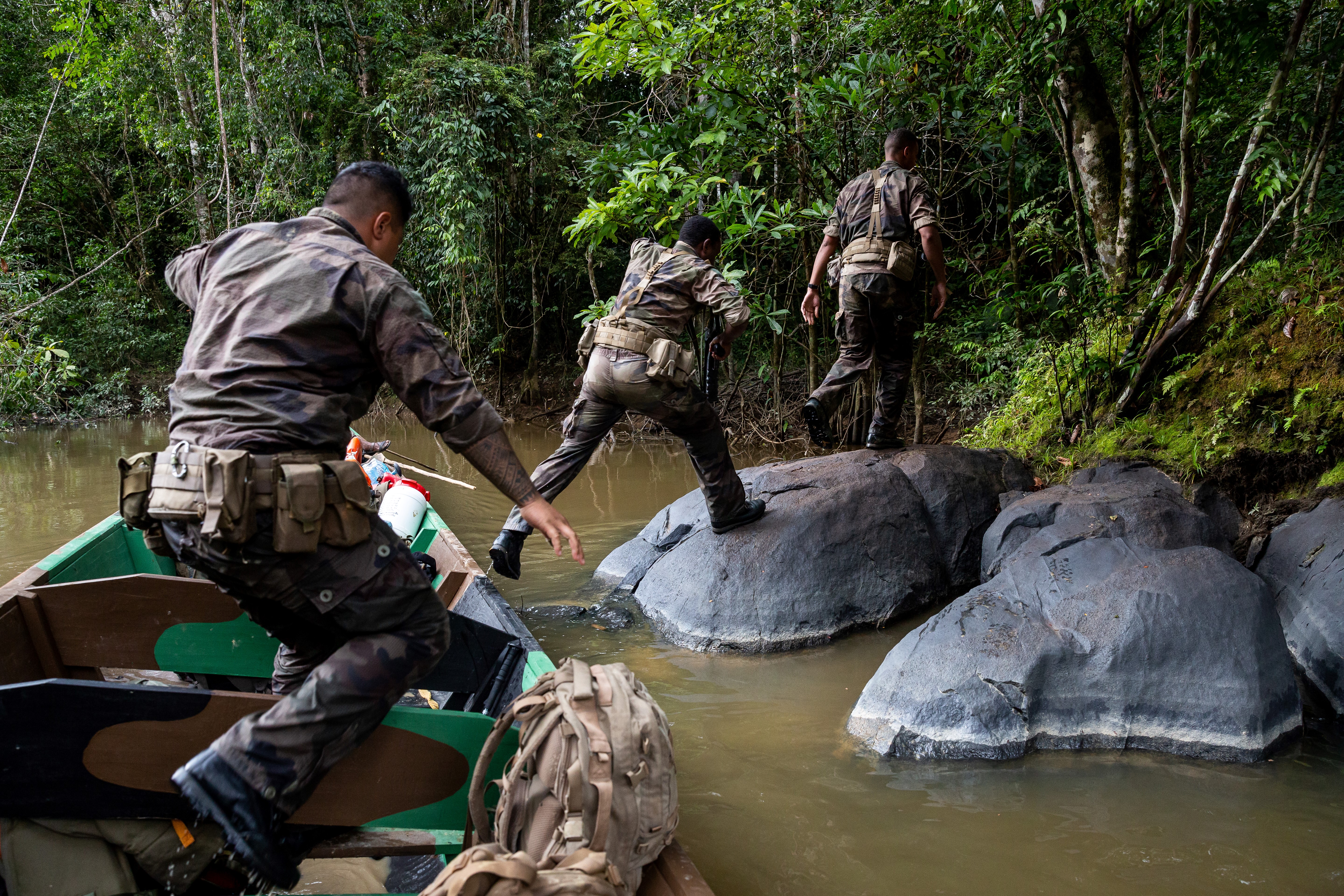‘They always come back’: French Guiana battles illegal gold hunters
The French military help patrol French Guiana’s jungle to drive out illegal gold prospecting (Jody AMIET)
La Providence, French Guiana (France) (AFP) – A soldier stealthily emerges from the dense undergrowth of French Guiana’s jungle, grabbing the shoulder of a man blasting gaping holes into the forest floor with a high-pressure hose, hoping the dirt will yield a golden payoff.
But the arrest of the clandestine gold panner, known as “garimpeiros”, will barely make a dent in the rampant illegal prospecting deep in this French corner of South America.
“At sites that are easy to get to, near the river, they come back with two motors and a chainsaw and restart their operations in three days, as soon as we’re gone,” said Thomas, a lieutenant-colonel in France’s Ninth Marine Regiment, giving only his first name in line with military policy.
AFP journalists accompanied members of the regiment this month on a patrol up the Maroni river, part of Operation Harpie, aimed at driving out miners and choking off supply lines to outlaw camps.
More than 500 soldiers, police, customs agents and rangers are tasked with patrolling the vast swaths of the Amazon forest where some 10,000 gold seekers are currently thought to be active.
Most come across the border from Brazil, mounting highly organised operations using motorised canoes and specially outfitted all-terrain vehicles (ATV).
Others are small-time panners without the resources to pay for their own boats or lookouts — like the garimpeiro and his two associates caught this month in front of AFP journalists.
Last year, 1,300 patrols were carried out — an average of 11 per day — leading to the discovery of 765 illegal sites and the seizure of equipment and cash worth 26 million euros ($30 million).
“As long as there’s gold, there will be garimpeiros,” Olivier Ginez, the French government’s top official in the territory, told AFP. “Our goal is to keep the panning at a relatively low level,” he said.
– ‘They know we’re watching’ –
The environmental advocacy group WWF says 10 to 12 tonnes of gold are illegally extracted each year in French Guiana by panners dislodging huge quantities of dirt to sift through makeshift sluices.
The damage to French Guiana’s lush landscape is devastating, with 13 tonnes of mercury, used for extracting the gold, contaminating the ground and rivers every year, the WWF says.
But even when planes or helicopters spot an illegal camp, it’s not easy for patrols to reach them.
Authorities rely on wooden canoes piloted by a few dozen Bushinengue, descendants of slaves brought to neighbouring Suriname in the 18th century, who later escaped into the jungle and learned the art of river navigation from native tribes.
“The rapids, the rocks, it’s very dangerous,” said Thomas, 51, at the bow of his canoe, still made with steel-covered joints that let a little water inside, keeping the hull supple in case of contact with rocks.
“I’ve got the lives of 10 people in my hands,” adds Thomas, who like other Bushinengue also serves as translator for the French forces.
Once on land, patrols face long slogs through jungle trails hacked out with machetes to reach their targets, who often have already been tipped off by lookouts and hidden much of their equipment before fleeing.
“They know we’re watching them. What they don’t know is when we’re going to come,” said Captain Charles.
– ‘Cutting the grass’ –
After a camp is found the soldiers immediately confiscate mobile phones to keep the men from alerting other miners in the area.
They then toil for hours breaking down sluices, destroying motors and other machinery, and searching for hidden stocks of diesel fuel and tools, often sinking into oily mud up to their waists.
Yet many times the miners have had ample time to gather up key gear onto their own canoes or Honda Foreman ATVs, fleeing deeper into the jungle or crossing the Maroni into Suriname, where soldiers and police will often look the other way for a few grams of gold.
“They come back. They always come back,” said Captain Jean-Sebastien.
“To keep my men motivated I tell them we’re here to cut the grass. If you don’t cut the grass you’ll soon have it up to your knees.”
But unable to keep tabs on every track into the forest, authorities focus instead on disrupting travel routes, for example destroying barges that force the miners to take long and costly detours.
“Our goal is to create insecurity and hinder the logistics of their operations,” said Ginez.
“I often ask soldiers how much beer or fuel is going for in the forest. If the price goes up, our operations are working,” he said.
Disclaimer: This story is published from a syndicated feed. Siliconeer does not assume any liability for the above story. Validity of the above story is for 7 Days from original date of publishing. Content copyright AFP.


